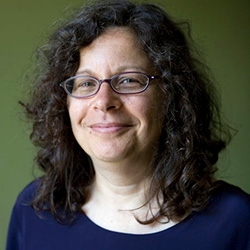

NVC Resources with Miki Kashtan
-
How DO we live our lives? What is an effective response to what is happening in the world? Listen in as Miki dialogs with a participant asking, "What is mine to do?", and honors the dissonance we feel when working to change.
-
Bring NVC beyond personal growth, explore perspectives that transform how we respond to crisis.
-
Use Convergent Facilitation to surface shared values and guide groups to supported decisions.
-
Explore how social systems shape personal experience, and how nonviolence can support healing.
-
Bring nonviolence to life through facilitation, integrate love and courage in every group process.
-
Each of us has a range of capacities. Miki Kashtan describes this as a range from "floor to ceiling." Floor capacity is what happens when you hit your limitation, ceiling capacity is when you are closest to functioning in line with your values and vision. This video describes the need to work on both to prevent the gap from expanding.
-
Empathy alone can be unreliable in guiding compassionate action. As seen in historical events, military training, personal anecdotes, and scientific experiments, empathy alone may not prevent people from harming others. A sense of duty or obedience, often instilled through fear of punishment and shame, might inhibit empathic action. The antidote may be to fostering empathy without resorting to control, shame, or punishment.
-
So many of us have a habitual response of trying to eliminate uncertainty and the arrival of what we don't want. Alternatively, we can embrace the irreducible uncertainty of life. This shift from resistance and helplessness to mourning allows acceptance of outcomes, reduction of stress, and opens the door to noticing and appreciating what's present and available amidst challenges.
-
Stay grounded in uncertainty by focusing on present facts instead of future speculation.
-
So many of us have been taught to solve conflicts by what is “fair.” However, Miki Kashtan states that fairness is a separating concept. In this video, she describes how when we do not have the conditions to care for all needs involved, when we live within separation, fairness is second best. 
-
Read here about patriarchy as a system, its impact on men and women, how its rooted in separation and control, leading to dominance and submission. Under patriarchy, even men are brutalized. Instead, we can embrace nonviolence to challenge patriarchy and its offspring (eg. capitalism, child trafficking, etc). And to make a lifelong commitment to undo socialization, act within our influence, and work towards liberation of all.
-
Historically, work, education, resources, land, animals, and relationships were intertwined, shattered by capitalism and industrialization. We transitioned from communal self-sufficiency to individualism, industry, and smaller families. To avert extinction and thrive, we need to reconstruct social systems, emphasizing the commons, uniting communities with the land and resources in interdependent, regenerative harmony.
-
The human species is trained and habituated towards separation. This model encourages humans to either give up on their needs or fight for their needs. In this short video, Miki shares how increasing capacity shifts habits of separation and supports holding of all needs. Through intensive lifelong practices we learn to increase our capacity to receive and to increase our capacity to be generous supports our overall capacity to hold all needs.
-
Total inclusion is impossible: inclusion of all can often lead to exclusion of those who can't bear the behaviors of some. Many groups flounder and disintegrate because of too much inclusion. Limited resources and capacities may make it necessary to exclude. Keeping more coherent shared values and strategies may be another reason to place membership conditions so that what appears to be exclusion may give movements a chance to expand.
-
Most people want to punish perpetrators of sexual violence. Unfortunately, punishment doesn’t lead to lasting widespread change. Rather, we can identify root causes and conditions that sustain violence. That means shifting from individual to systemic lenses, and from punitive to restorative responses. It means collective learning about how such acts are nurtured and persist. This can reduce the chance of it happening again.
-
Whether privileged or not, its not easy to see the humanity of others in different social locations, especially if their actions have unwanted impacts and have left behind our humanity. Aiming for “both sides hearing each other” empathically, and to focus on effect rather than intent when we have more privilege, may theoretically lead to liberation. Yet, in practice it can reinforce rather than transcend power differences -- unless there's specific ways to focus attention and choice. Here, its important to transform expectations into working with willingness, and within our own terms and timetable.
-
The word "privilege" signifies the benefit to the person having it, and the relationship between that person’s benefit and others' lack of benefit. When privileged, there are incentives to not see this interdependent link. For instance, it's easier for the wealthy to think of the poverty of many and the wealth of some are unrelated. If the wealthy want to keep wealth they would need to continue with approaches rooted in this separation.
-
Whether we have more or less power and privilege, anything without liberation for all is within patriarchal separation, and will continue cycles of oppression. To liberate ourselves and one another we need to increase our collective capacity through developing related knowledge, skills, research; build an understanding of patriarchal roots; confront lovingly; co-hold dilemmas about privilege; co-shape outcomes; etc.
-
The human species is trained and habituated towards separation. This model encourages humans to either give up on their needs or fight for their needs. In this short video, Miki shares how increasing capacity shifts habits of separation and supports holding of all needs.
-
When we have privilege, we can have access to resources resulting from legal or social norms related to membership in a group -- independent of any (in)action, awareness of the disparity, the potential benefits to us, or the costs to others. Unhelpful ways of engaging with privilege are: denial/invisibility, guilt/shame, defensiveness, and entitlement. Helpful ways of engaging are: owning privilege, learning about privilege, opening to feedback, and stewarding privilege for benefit of all. To be helpful we need to engage with necessary (rather than unnecessary) discomfort.
Quick Links

Stay in Touch!
We value your privacy, won't share your email address and you can easily unsubscribe any time.
















